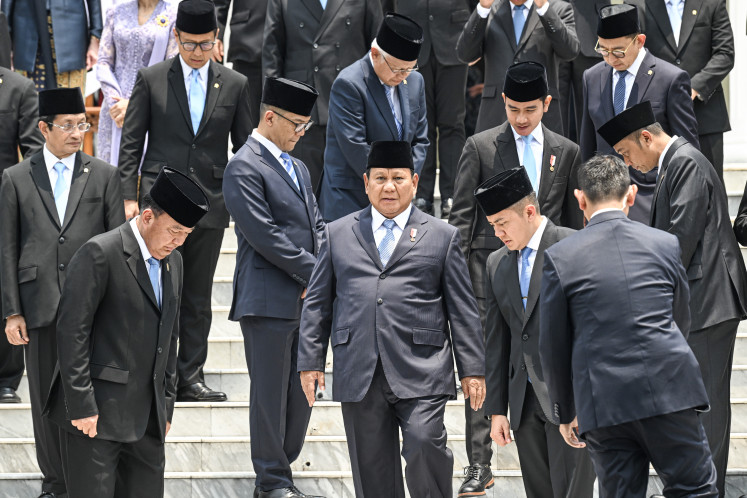Popular Reads
Top Results
Can't find what you're looking for?
View all search resultsPopular Reads
Top Results
Can't find what you're looking for?
View all search results‘Nagara Rimba Nusa’ announced as winner of new capital city design contest
Grand plan: Public Works and Housing Minister Basuki Hadimuljono (right) listens to an explanation from an official on a city landscape model titled “Nagara Rimba Nusa”, which won first prize in a competition on designing the new Indonesian capital, at the Public Works and Housing Ministry in Jakarta on Monday
Change text size
Gift Premium Articles
to Anyone
G
rand plan: Public Works and Housing Minister Basuki Hadimuljono (right) listens to an explanation from an official on a city landscape model titled “Nagara Rimba Nusa”, which won first prize in a competition on designing the new Indonesian capital, at the Public Works and Housing Ministry in Jakarta on Monday. (Twitter @KemenPU)
The Public Works and Housing Ministry has announced the “Nagara Rimba Nusa” design as the winner of the design contest for the country’s new capital city in East Kalimantan
The design, created by architecture and urban design studio URBAN+, beat concepts from 755 other contestants to win a prize of Rp 2 billion (US$142,963).
“Their design will be developed into a capital planning design document according to the framework that has been expressed by President Jokowi,” the ministry’s director general of Cipta Karya, Danis Sumadilaga, who is also the head of the contest committee, said on Monday as quoted by kompas.com.
The ministry also announced four runners-up: “The Infinite City”, “A Thousand Furrows”, “The Emerald of the Equator” and “The Village of the People of the Archipelago”.
The winning design, which roughly translates to “Archipelago Forest City”, was inspired by the Indonesian archipelago and includes concepts for the Indonesia Raya (Great Indonesia) presidential palace and the Bhinneka Tunggal Ika (Unity in Diversity) plaza.
Sibarani Sofian, the founder of URBAN+, said he had enlisted the help of many partners, including those from outside Indonesia, to create the design.
“Of course I could not make it myself. I have friends from Hong Kong, Singapore and other places and we worked on this together,” Sibarani said as quoted by tribunnews.com.
“The inspiration came from many different places but we also used the elements of [state ideology] Pancasila that are related to the design of the capital.”
Despite winning the contest, "Nagara Rimba Nusa" would not be used as the sole blueprint for the new capital city, with Danis saying the government would collaborate with the top three contestants as well as international designers.
"We will sharpen the [design] process up to March or April," he said.
Public Works and Housing Minister Basuki Hadimuljono said the top three designs for the new capital had fulfilled three criteria for the city: it had to symbolize an advanced Indonesia, it had to be environmentally friendly and it had to be designed with future generations in mind.
The three criteria are in line with the ministry’s plan to build the new capital city under the concept of a so-called forest city or biocity. The concept aims to urge authorities to prioritize the environment in the city’s development.
“In January 2020, we will bring the top three winners to survey the new capital location so that they can get a sense of place starting from the center of the central government area,” Basuki said as quoted by Antara news agency.
President Joko “Jokowi” Widodo picked last week the exact location for the new capital city in North Penajam Paser and Kutai Kartanegara, East Kalimantan. The city’s ground zero sits on parts of a former industrial timber estate (HTI) belonging to International Timber Corporation (ITCI) Hutani Manunggal and ITCI Kartika Utama.
The new capital is expected to cover up to 256,000 hectares of land in the area between the two regencies. The central government is estimated to need only 5,600 ha, leaving space for plenty of land to be replanted with trees.
“After visiting the area yesterday, I can guarantee that urban planners and architects will be delighted with such hilly contours. It will be more beautiful than a flatter [terrain],” Jokowi told the press in Balikpapan recently.
The government expects the plan to cost Rp 466 trillion, more than half of which will be sourced from public-private partnership schemes, with construction to begin late next year. It is also drafting necessary regulations, including an omnibus law amending at least 14 prevailing laws, to support both the capital relocation and construction. (kmt/kuk)










